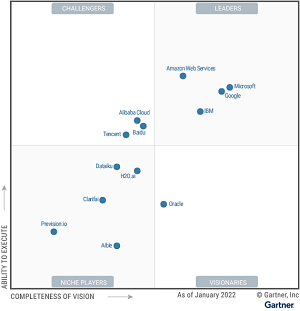News
Microsoft, AWS Lead Cloud AI Developer Services Evaluations
Microsoft and Amazon Web Services (AWS) led a host of vendors in an evaluation of cloud AI developer services published by research firm Gartner.
In the firm's Magic Quadrant report that separates vendors into four sections for Leaders, Visionaries, Niche Players and Challengers along axes for "ability to execute" and "completeness of vision," Microsoft was highest on the latter axis while AWS led the "ability to execute" axis.
In defining and describing the subject of the report, Gartner said: "Cloud AI developer services (CAIDS) are cloud-hosted or containerized services that enable development teams and business users who are not data science experts to use artificial intelligence (AI) models via APIs, software development kits (SDKs) or applications. They help these users deliver services with capabilities in the areas of automated machine learning (autoML), language and vision -- for example, natural language understanding (NLU), sentiment analysis, image recognition and machine learning (ML) model pipeline services."
"We are proud to be recognized for our Azure AI Platform," Microsoft said in a blog post this week about the report.
That Azure AI platform comprises a portfolio of AI services designed for developers and data scientists, helping them leverage high-quality vision, speech, language, and decision-making AI models through simple API calls, while also enjoying the ability to roll their own machine learning models using tools such as Jupyter Notebooks, Visual Studio Code and open source frameworks such as TensorFlow and PyTorch.
As shown in the graphic below, the other vendors in the "Leaders" section are Google and IBM.
 [Click on image for larger view.] Magic Quadrant for Cloud AI Developer Services (source: Gartner).
[Click on image for larger view.] Magic Quadrant for Cloud AI Developer Services (source: Gartner).
Noting that Microsoft was dubbed a "Leader," the report said: "Its Azure AI platform has a comprehensive offering for all three use cases: language, vision and autoML. Microsoft's operations are global, and it has customers across all industries. Its services can be consumed by professional developers via APIs and SDKs, and by citizen developers via Microsoft Power Platform. Microsoft leads the industry in terms of enterprise-quality properties, such as integration, scalability, performance, security, privacy, transparency, explainability and responsible use of AI."
For strengths of Microsoft's offering, the research firm listed:
- Business model: Microsoft differentiates its AI developer services by making it easy for both professional programmers and citizen developers to use ML, language and vision services in their applications. Microsoft's internal use of CAIDS across its product lines provides a distinct advantage, enabling it to improve quality and time to market faster than its competitors.
- Sales execution: Microsoft competes with the nimbler vendors in this market by offering its AutoML features for free and charging for compute and storage. To serve customers with a high volume of AI workloads, Microsoft is introducing a "commitment tier." This option (currently in public preview) will offer a lower per-unit price but require a constant-use commitment. Microsoft also invests heavily in sales engineering. Its AI solution architects, also known as AI rangers, are dedicated to making proofs of concept successful and deployable.
- Market responsiveness and track record: Microsoft has democratized AI development by making it easy for fusion teams to consume AI safely and responsibly. The company draws on and contributes to many projects in the open-source community. It continuously improved its services in 2021, with more than 30 launches, including major feature releases. Additionally, Microsoft is encouraging developers to commit to its marketplace by reducing commissions to 3 percent (down from the industry average of 20 percent).
Cautions, meanwhile, included:
- Geographic strategy: Microsoft offers its full portfolio of services in the Americas, but does not offer all these services elsewhere. Potential customers should determine whether Microsoft offers and supports the services they need in their region.
- Customer experience: Customer sentiment for Microsoft is lower than that for other Leaders in this Magic Quadrant. Potential customers should insist on a strong commitment to service from Microsoft beyond the initial sale.
- Product or service: To continue offering a solid product, Microsoft needs to keep up with its competitors in terms of targeting new hardware platforms and accelerators. It must also deliver innovations in feature engineering, such as mixed-modal feature generation. Its lack of synthetic image generation is another limitation.
Looking ahead, Gartner sees good things for the market in general.
"We predict that, by 2025, 70 percent of new, internally developed applications will incorporate AI- or ML-based models," the report said. "CAIDS provide developers with the autoML capabilities they need to create and customize ML models for their applications. These ML models can classify information, predict trends, assess risks, automate processes and improve a business across all functional areas and workflows.
"Software engineering teams are using ML models to build compelling applications by adding to, or otherwise enhancing, the functionality of existing applications and by creating entirely new types of applications."
About the Author
David Ramel is an editor and writer at Converge 360.